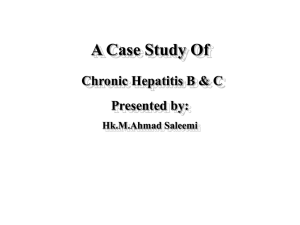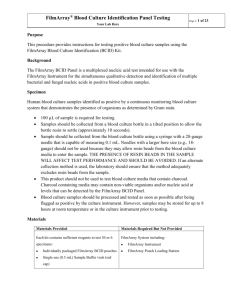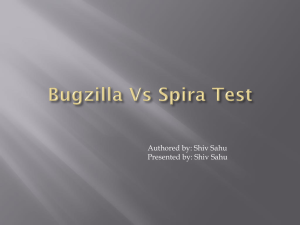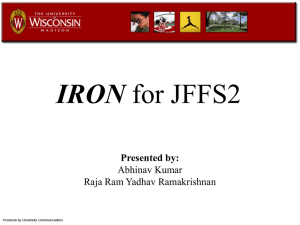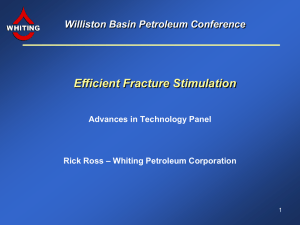Gastem USA Ross #1 Well - Otsego County Conservation Association
advertisement
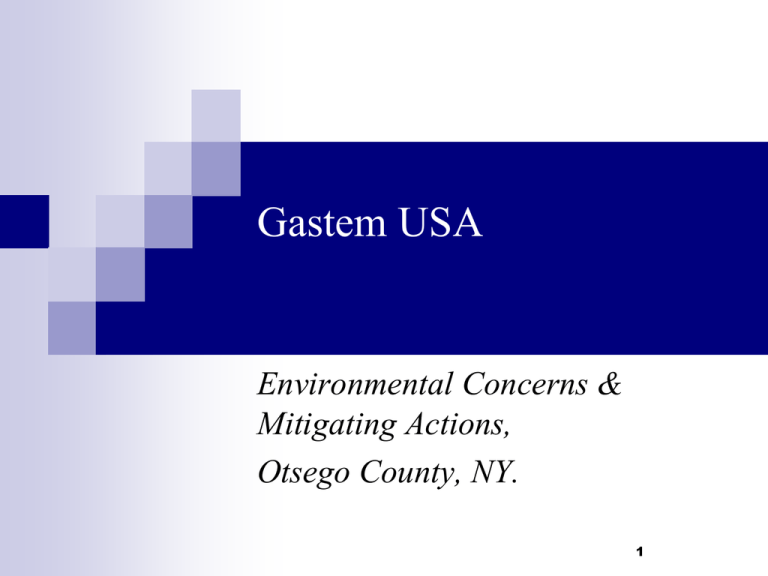
Gastem USA Environmental Concerns & Mitigating Actions, Otsego County, NY. 1 Gastem USA: An Introduction WHO: Orville Cole, Gastem USA, Thomas Byrnes, Hydro-geologist, Strategic Environmental, Rich Nyahay, Senior Geologist Gastem USA, Meghan Leaver, Gastem Inc., Environmental Affairs, Aaron Sulkey, Environmental Scientist Gastem USA, Tiffany McGivern, Hydrology Intern Gastem USA WHAT: Natural Gas Exploration in New York State WHERE: Otsego, Delaware Counties, New York State WHEN: On-Going Exploration Pro Environment and Pro Growth Water Use; volume of water use, drainage issues (sediment load), chemical introductions, disposal and aquifer facts Impact to Community; Open dialogue, economic implications and education Terrestrial Change; landscape ecology, logging, wildlife, access improvement, land use changes Protection Policies and Procedures; Federal, Regional, State and Industry Best Practises Community and Public Disclosure Publicly available lab results Town hall sessions, including Town of Maryland official representatives, City officials in Soil and Water Management, Emergency Response team and 911 first responders Local media representation and access to site Natural Gas Drilling: Fact Sheet Conductor was set through the glacial till to a solid rock seat. 16 inch to 126’ and 10 inch to 138’ 7 inch Surface Casing was set at 780’ and cemented to surface. This is 95’ below the deepest water well within 2 miles. 4.5 inch casing to 4950’ cemented to surface. Baseline Water Quality Study Tested over 200 wells Tested all wells within a 1 mile radius of the immediate site *Intro Tiffanys poster, post frac test results 6 Residential Well Sampling Analysis List Dissolved methane, propane and ethane Volatile Organic Compounds (EPA Method 524 or 8260) Glycols pH Conductivity Chloride Alkalinity Sulfate Total Dissolved Solids Total Suspended Solids Calcium Magnesium Sodium Potassium Iron Manganese Arsenic Barium Chromium Lead Lithium Strontium H2O Management and Mitigation Volumes: Permitted an 80,000 gallon frac job and subsequent disposal of 38,160 gallons of frac flowback fluid and 21,000 gallons of freshwater Aquifer SWPPP to mitigate increased sediment load issues Chemical Introductions Aquifer Useable aquifer has been detected within a few feet of hydrocarbon sources in Otsego County (Insert Bond Log) 9 Drilling Fluids NYSDEC permit reads « …All drilling fluids, fluids displaced out of the well during cementing, and well water (collectively the fluid) must be contained in a water-tight tank or container and disposed of properly. » Water and Disposal of Fluids Disposal of 38,160 gallons of frac flowback fluid to Watertown facility in January 2010. Full battery of tests and lab analysis from third party certified labs including testing for TDS, TSS, heavy metals and radioactivity testing Baseline testing on all wells within 2 miles of the drill site (current government qualification is 2000 ft.) Utica Flowback Results – Summary of Significant Detections TDS – 6,460 mg/l Chloride – 5,070 mg/l Barium – 15.3 mg/l Iron - 38.1 mg/l Sodium – 2,600 mg/l Strontium – 34.1 mg/l Organic Compounds: Toluene – 0.074 mg/l Residential Well Sampling Results Summary – Well A Well A Well A Well A 3/26/10 Calcium Groundwater or Drinking Water Standard or Guidance Value No standard 8/20/08 26 mg/l 12/17/09 27 mg/l 27 mg/l Magnesium No standard 6.1 mg/l 5.9 mg/l 5.6 mg/l Sodium 20 mg/l 37 mg/l 39 mg/l 40 mg/l Potassium No standard 0.93 mg/l 0.57 mg/l 0.84 mg/l Iron 300 µg/l Not Detected Not Detected Not Detected Arsenic 25 µg/l Not Detected 1.9 µg/l Not Detected Barium 1000 µg/l 64 µg/l 62 µg/l 60 µg/l Chromium 50 µg/l Not Detected 6.6 µg/l Not Detected Lead 15 µg/l Not Detected Not Detected Not Detected Mercury 0.7 µg/l Not Detected Not Detected Not Detected Strontium No Standard 570 ug/l 580 µg/l 540 µg/l Chloride 250 mg/l 1.6 mg/l 1.1 mg/l 1.5 mg/l Total Dissolved Solids 500 mg/l 230 mg/l 210 mg/l 190 mg/l Standards vary by compound Not Detected Not Detected Not Detected 10 mg/l Not Detected Not Detected Not Detected Analysis Volatile Organic Compounds Dissolved Methane Residential Well Sampling Results Summary – Well B Laboratory Analysis Calcium Groundwater or Drinking Water Standard or Guidance Value No standard Magnesium Well B Well B 9/30/09 Well B 1/13/10 Well B 4/20/10 32 mg/l 31 mg/l 32 mg/l 33 mg/l No standard 8 mg/l 7.8 mg/l 8.0 mg/l 8.2 mg/l Sodium 20 mg/l 26 mg/l 24 mg/l 25 mg/l 26 mg/l Potassium No standard 0.68 mg/l 0.59 mg/l 0.73 mg/l 0.73 mg/l Chloride 250 mg/l 2 mg/l 2 mg/l 2.5 mg/l 2.6 mg/l Iron 300 µg/l 55 ug/l 64 ug/l 50 ug/l 59 ug/l Lithium No standard 10 ug/l 8.4 ug/l 11 ug/l Not Analyzed Manganese 300 µg/l 210 ug/l 230 ug/l Not Analyzed Not Analyzed Arsenic 25 µg/l Not Detected Not Detected 1.6 ug/l Not Analyzed Barium 1000 µg/l 1.9 µg/l 38 ug/l 40 ug/l 38 ug/l Chromium 50 µg/l 11 µg/l Not Detected 3.9 ug/l Not Detected Lead 25 µg/l Not Detected Not Analyzed Not Analyzed Not Detected Strontium No standard 170 µg/l 170 ug/l 180 ug/l 170 ug/l Sulfate 250 mg/l 6.6 mg/l Not Detected 5.7 mg/l 11 mg/l Alkalinity No standard 160 mg/l 160 mg/l 170 mg/l 160 mg/l Total Dissolved Solids 500 mg/l 220 mg/l 190 mg/l 162 mg/l 190 mg/l Total Suspended Solids No standard Not Detected Not Detected Not Detected Not Detected Dissolved Methane 10 mg/l Not Detected Not Detected Not Detected Not Detected 8/6/09 SWPPP: Stormwater Pollution Prevention Plan “A plan required for major construction projects under the U.S. Environmental Protection Agency National Pollutant Discharge and Elimination System … The SWPPP is required to address measures to prevent erosion, sedimentation, and other potential discharges of pollutants to water bodies and wetlands” Department of Transportation, 2008. http://www.1395-rt9study.com/glossary.html SWPPP: Ross #1 Minimise effluent and sediment run-off to the water ecosystem Constructed by a certified hydrogeologist in adherence with stipulated guidelines Terrestrial NYSDEC permit reads « If any archeological or structural remains are encountered during site construction operations, the permittee must immediately cease, or cause to cease, all work and notify the Albany Mineral Resources office. Work shall not resume until written permission to do so has been received from the Department. » Innovations: Land Use Beneficial Use Determination (BUD) study in conjunction with local academic institutions (liming agent for agriculture) Matting versus gravel on well site - reuse and recycle matting materials (insert photos) 18 Accountability Structure Federal: EPA Regional: SRBC State: NYSDEC County: Department of Soil & Water Conservation & Emergency Services Industry Standards: Gastem USA Best Practises Regulatory Jurisdiction The Environmental Protection Agency (EPA)– Regulates the operations of all effluent from Waste Treatment Facilities to Rivers & Streams. The Susquehanna River Basin Commission (SRBC) controls the use of all fresh water surface and sub-surface in the basin which encompasses much of south central New York State, Pennsylvania and Delaware. The New York Department of Environmental Conservation (NYSDEC) oversees the drill permitting, water management and site constructions and remediation Industry Best Practises: Gastem USA Gastem has experience across North America and has proposed operations formulas that align with the exploratory nature of our work in NYS. We have used a minimum of 1 mile radius for baseline test water analysis of surface stream, ponds and private water wells. Our Company practise is to cement the production casing string from total depth to surface to avoid zonal migration. Example of a Gas Chimney 22 Shallow Water & Gas Intervals




